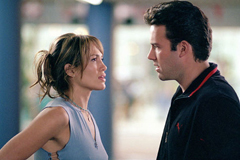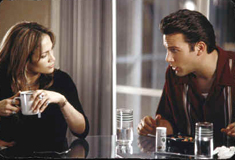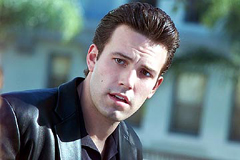Gigli (Martin Brest, 2003)
 First a confession: Jennifer Lopez’s screen presence has
an effect on me that makes me forgive stuff in movies that I might otherwise
find repugnant. She’s a wondrously compassionate screen presence and is
consistently better than she’s given credit for by the masses. To my surprise,
I don’t think Lopez’s performance is the best thing about Gigli.
Despite the hype, it’s genuinely a good movie, with numerous virtues. Now an
accusation: a vast majority of lazy critics have almost uniformly ignored the
obvious strengths of Gigli in an attempt to outdo each other in slinging
spite. Whereas a good film critic should be part of the solution to our tabloid
culture and should encourage deeper thinking in their audiences, the majority of
film critics seem content to lower themselves to name-calling and gossip in
their reviews of this film (most of them missing the fact that Halle Berry was
originally cast in the Lopez role in their attempts to present it as a vanity
project). Obviously, not all critics who dislike Gigli are fools, and
there are a smattering of valid complaints out there, but by and large the
critical community has immolated the most challenging and provocative film that
has come out of Hollywood this year.
First a confession: Jennifer Lopez’s screen presence has
an effect on me that makes me forgive stuff in movies that I might otherwise
find repugnant. She’s a wondrously compassionate screen presence and is
consistently better than she’s given credit for by the masses. To my surprise,
I don’t think Lopez’s performance is the best thing about Gigli.
Despite the hype, it’s genuinely a good movie, with numerous virtues. Now an
accusation: a vast majority of lazy critics have almost uniformly ignored the
obvious strengths of Gigli in an attempt to outdo each other in slinging
spite. Whereas a good film critic should be part of the solution to our tabloid
culture and should encourage deeper thinking in their audiences, the majority of
film critics seem content to lower themselves to name-calling and gossip in
their reviews of this film (most of them missing the fact that Halle Berry was
originally cast in the Lopez role in their attempts to present it as a vanity
project). Obviously, not all critics who dislike Gigli are fools, and
there are a smattering of valid complaints out there, but by and large the
critical community has immolated the most challenging and provocative film that
has come out of Hollywood this year.
 Far from the cute romantic comedy or mob farce that one
might expect, Gigil is a laid back, character-driven movie. The plot
picks up as low-level thug Larry Gigli (Ben Affleck) kidnaps the mentally
handicapped Brian (newcomer Justin Bartha), in an attempt to force a federal
prosecutor to drop charges against a mob boss. Before long, “Ricki”
(Jennifer Lopez), a second agent of the mobster, shows up at Larry’s
apartment, and the two begin an adversarial relationship that leads to Larry’s
personal growth. Obviously, those who find stars Ben Affleck and Jennifer Lopez
intolerable will have difficulties embracing the film, but I genuinely liked
these characters. Many of the pleasures that the film offers are found in the
dynamics of watching the actors play off one another as they sit around
chatting. As an R-rated, mature, and poignant comedy that displays an almost
European sensibility at times, the film Gigli most reminds me of is Rain
Man. It’s shocking that material that’s similar to a Best Picture winner
from fifteen years ago could be considered unfathomable subject matter in this
day and age. Rarely is a Hollywood movie, especially one released during the
summer, so focused on dialogue and so willing to present actual ideas. For those
on the fence regarding my endorsement of Gigli’s quality, remember that
the excellent, intelligent Out of Sight (the last talky summer movie that
Lopez starred in) was also a commercial disappointment.
Far from the cute romantic comedy or mob farce that one
might expect, Gigil is a laid back, character-driven movie. The plot
picks up as low-level thug Larry Gigli (Ben Affleck) kidnaps the mentally
handicapped Brian (newcomer Justin Bartha), in an attempt to force a federal
prosecutor to drop charges against a mob boss. Before long, “Ricki”
(Jennifer Lopez), a second agent of the mobster, shows up at Larry’s
apartment, and the two begin an adversarial relationship that leads to Larry’s
personal growth. Obviously, those who find stars Ben Affleck and Jennifer Lopez
intolerable will have difficulties embracing the film, but I genuinely liked
these characters. Many of the pleasures that the film offers are found in the
dynamics of watching the actors play off one another as they sit around
chatting. As an R-rated, mature, and poignant comedy that displays an almost
European sensibility at times, the film Gigli most reminds me of is Rain
Man. It’s shocking that material that’s similar to a Best Picture winner
from fifteen years ago could be considered unfathomable subject matter in this
day and age. Rarely is a Hollywood movie, especially one released during the
summer, so focused on dialogue and so willing to present actual ideas. For those
on the fence regarding my endorsement of Gigli’s quality, remember that
the excellent, intelligent Out of Sight (the last talky summer movie that
Lopez starred in) was also a commercial disappointment.
 Three times during Gigli, different characters utter
the line, “You never know.” That simple platitude achieves something
resembling resignation to the sexual flip-flopping that comes to be the norm in
the film’s worldview. The adult frankness that is displayed throughout is
refreshing. Since most Hollywood movies don’t even acknowledge that the penis
or vagina exist, it’s surprising to hear characters relating to one another
maturely about sex here. Gigli has a
series of superbly scripted and beautifully acted conversations that playfully
pit the lesbian Ricki against the chauvinistic Larry, and the audacity that
Brest demonstrates in tackling his subject matter while remaining in the mode of
popular storytelling is admirable (Lopez’s pose – and the outline in her
yoga outfit - as she utters the nearly taboo words “my pussy” are
priceless). This is a film where sex is just sex and sexual preference is just a
preference. Perhaps because it’s so willing to challenge mainstream depictions
of sexuality (emasculating Larry as it does), audiences have largely rejected
it.
Three times during Gigli, different characters utter
the line, “You never know.” That simple platitude achieves something
resembling resignation to the sexual flip-flopping that comes to be the norm in
the film’s worldview. The adult frankness that is displayed throughout is
refreshing. Since most Hollywood movies don’t even acknowledge that the penis
or vagina exist, it’s surprising to hear characters relating to one another
maturely about sex here. Gigli has a
series of superbly scripted and beautifully acted conversations that playfully
pit the lesbian Ricki against the chauvinistic Larry, and the audacity that
Brest demonstrates in tackling his subject matter while remaining in the mode of
popular storytelling is admirable (Lopez’s pose – and the outline in her
yoga outfit - as she utters the nearly taboo words “my pussy” are
priceless). This is a film where sex is just sex and sexual preference is just a
preference. Perhaps because it’s so willing to challenge mainstream depictions
of sexuality (emasculating Larry as it does), audiences have largely rejected
it.
 It’s in this liberated environment that Larry moves
beyond the macho posturing that initially defines him toward something a bit
more sensitive. The film’s central thesis examines the way that men posture as
much for each other as they do for the women that they hope to attract and has
the sense to call such behavior immature. Although Gigli repeatedly insists that
his name rhymes with “really”, there’s not much about him that’s
“really” apparent. The mob culture that Larry attempts to blend into and the
hip-hop culture that we see Brian embracing share a common bond in that both of
them value the aggressive boast of virility above all else. When Brian makes an
offhand comment calling Larry “old school”, he’s complimenting him, but
also subtly commenting on how outmoded his “gangster” behavior is. Gigli
is a smart movie, and it’s bright enough to realize that there are only a
few degrees of separation between Brian’s naïve euphemism for his ejaculation
(“She makes my penis sneeze.”) and Larry’s description of his own penis as
a bull’s horn. Those who complain that Gigli’s
mob plot isn’t integrated well enough with its romance are not only not
looking closely enough at how Brest uses it to comment on gender roles, but are
also forgetting how clumsily a mob plot was tacked onto Billy Wilder’s Some
Like it Hot, which is generally considered the defining comedy of gender
politics by the same masses that have no apparent use for Gigli.
It’s in this liberated environment that Larry moves
beyond the macho posturing that initially defines him toward something a bit
more sensitive. The film’s central thesis examines the way that men posture as
much for each other as they do for the women that they hope to attract and has
the sense to call such behavior immature. Although Gigli repeatedly insists that
his name rhymes with “really”, there’s not much about him that’s
“really” apparent. The mob culture that Larry attempts to blend into and the
hip-hop culture that we see Brian embracing share a common bond in that both of
them value the aggressive boast of virility above all else. When Brian makes an
offhand comment calling Larry “old school”, he’s complimenting him, but
also subtly commenting on how outmoded his “gangster” behavior is. Gigli
is a smart movie, and it’s bright enough to realize that there are only a
few degrees of separation between Brian’s naïve euphemism for his ejaculation
(“She makes my penis sneeze.”) and Larry’s description of his own penis as
a bull’s horn. Those who complain that Gigli’s
mob plot isn’t integrated well enough with its romance are not only not
looking closely enough at how Brest uses it to comment on gender roles, but are
also forgetting how clumsily a mob plot was tacked onto Billy Wilder’s Some
Like it Hot, which is generally considered the defining comedy of gender
politics by the same masses that have no apparent use for Gigli.
 The meaty, unresolved arc that Larry’s character follows
provides the best material in Gigli,
and helps the movie attain genuine poignancy. Brest isn’t afraid to examine
the loneliness that Larry struggles with, even if he only makes the depth of his
depression apparent as Gigli grows increasingly stressed out by his job. It
becomes apparent that the gangsters that Larry associates with expect him to
behave as he does, and since he is an admittedly lonely man, he likely feels
that no other group is willing to accept him and adapts accordingly. The gradual
emasculation that he undergoes is gratifying instead of tragic because it
underlines the fact that the “cool” gangster that so many movies try to sell
us is a myth. As the movie progresses, Larry backpedals from his earlier sexual
boasts (“Gobble, gobble” Ricki confidently commands, and he withers), finds
himself warming up to others, and is revealed as a decent man underneath his
brash exterior. Ricki repeatedly states that she suspects Larry is gay and a
quip that she makes about how good he’d look in mascara suggests that she’d
be at least as likely to try to help him explore his feminine side as sleep with
him again. Perhaps the most stinging demonstration of the conflict that exists
between the man Larry is and the man he might become occurs during a scene in
which he’s sitting in a car, confessing his misery with his current lot in
life to Ricki. The moment that his boss pulls up in another car, Larry stops
being forthright and resumes his macho act. It’s a subtle moment, but one that
shows the audience that his character won’t change overnight and prepares us
for an unresolved ending. Though subtle, graceful storytelling is the last thing
you’d expect from the director of the crass, manipulative Scent of a Woman,
Gigli doesn’t overstate itself (obviously, since so many critics seemingly
missed its point) in its quest to thoughtfully observe its titular character.
The meaty, unresolved arc that Larry’s character follows
provides the best material in Gigli,
and helps the movie attain genuine poignancy. Brest isn’t afraid to examine
the loneliness that Larry struggles with, even if he only makes the depth of his
depression apparent as Gigli grows increasingly stressed out by his job. It
becomes apparent that the gangsters that Larry associates with expect him to
behave as he does, and since he is an admittedly lonely man, he likely feels
that no other group is willing to accept him and adapts accordingly. The gradual
emasculation that he undergoes is gratifying instead of tragic because it
underlines the fact that the “cool” gangster that so many movies try to sell
us is a myth. As the movie progresses, Larry backpedals from his earlier sexual
boasts (“Gobble, gobble” Ricki confidently commands, and he withers), finds
himself warming up to others, and is revealed as a decent man underneath his
brash exterior. Ricki repeatedly states that she suspects Larry is gay and a
quip that she makes about how good he’d look in mascara suggests that she’d
be at least as likely to try to help him explore his feminine side as sleep with
him again. Perhaps the most stinging demonstration of the conflict that exists
between the man Larry is and the man he might become occurs during a scene in
which he’s sitting in a car, confessing his misery with his current lot in
life to Ricki. The moment that his boss pulls up in another car, Larry stops
being forthright and resumes his macho act. It’s a subtle moment, but one that
shows the audience that his character won’t change overnight and prepares us
for an unresolved ending. Though subtle, graceful storytelling is the last thing
you’d expect from the director of the crass, manipulative Scent of a Woman,
Gigli doesn’t overstate itself (obviously, since so many critics seemingly
missed its point) in its quest to thoughtfully observe its titular character.
 For a film focused so intensely on the interactions between
characters, it’s key that the performances be up to par. Luckily, each member
of Gigli’s cast distinguishes
themselves while helping to drive home the film’s central concerns. Very
consistently, Ben Affleck is a better supporting actor than a lead, with the
notable exception of Kevin Smith’s Chasing Amy, which although
inferior, perhaps not coincidentally is the film in his body of work that Gigli
most resembles. He’s by
turns short-tempered, bullish, charming and vulnerable here, exhibiting more
range than ever before. If he and Lopez are not quite convincing as a
gangster’s thugs, perhaps it’s important to understand their reluctance in
those roles. The film is paced well, with definite chemistry and much tension
(both sexual and comic) in the central relationship. Oftentimes, Lopez doesn’t
respond when Gigli talks, and allows him to puff himself up until he feels
he’s established his dominance. The actress clearly realizes that often the
coolest reply to a boast is to make no reply, and the control that she exhibits
throughout her performance makes it one of her best. Ricki doesn’t change
nearly as much as Larry during the film, but she reveals layers of compassion
that disarm the initial impression that she’s a sex object and helps to
alleviate the feeling that she’s a convenient device for Brest’s screenplay.
As the retarded Brian, Bartha has a challenging role, and acquits himself well.
Essentially he channels Hoffman’s Rain
Man performance, but is funnier and has the added benefit of working in a
script that doesn’t use his character as a blatant, lesson-spouting mouthpiece
for the screenwriter. Though Larry’s character grows nicer to Brian as he
loses his edge, at no point is Brian presented as a source of “simple is
true” wisdom. In a superb, one-scene cameo, Christopher Walken plays a Federal
Investigator and manages to adds suspense to the rest of the film. With little
more than his oddball presence, he leaves a lingering impression that the
kidnappers might get caught.
For a film focused so intensely on the interactions between
characters, it’s key that the performances be up to par. Luckily, each member
of Gigli’s cast distinguishes
themselves while helping to drive home the film’s central concerns. Very
consistently, Ben Affleck is a better supporting actor than a lead, with the
notable exception of Kevin Smith’s Chasing Amy, which although
inferior, perhaps not coincidentally is the film in his body of work that Gigli
most resembles. He’s by
turns short-tempered, bullish, charming and vulnerable here, exhibiting more
range than ever before. If he and Lopez are not quite convincing as a
gangster’s thugs, perhaps it’s important to understand their reluctance in
those roles. The film is paced well, with definite chemistry and much tension
(both sexual and comic) in the central relationship. Oftentimes, Lopez doesn’t
respond when Gigli talks, and allows him to puff himself up until he feels
he’s established his dominance. The actress clearly realizes that often the
coolest reply to a boast is to make no reply, and the control that she exhibits
throughout her performance makes it one of her best. Ricki doesn’t change
nearly as much as Larry during the film, but she reveals layers of compassion
that disarm the initial impression that she’s a sex object and helps to
alleviate the feeling that she’s a convenient device for Brest’s screenplay.
As the retarded Brian, Bartha has a challenging role, and acquits himself well.
Essentially he channels Hoffman’s Rain
Man performance, but is funnier and has the added benefit of working in a
script that doesn’t use his character as a blatant, lesson-spouting mouthpiece
for the screenwriter. Though Larry’s character grows nicer to Brian as he
loses his edge, at no point is Brian presented as a source of “simple is
true” wisdom. In a superb, one-scene cameo, Christopher Walken plays a Federal
Investigator and manages to adds suspense to the rest of the film. With little
more than his oddball presence, he leaves a lingering impression that the
kidnappers might get caught.
 Even from a technical standpoint, Gigli presents little to complain about. There are numerous touches
that make the world it inhabits feel lived in. Larry’s thug boss, transposed
to Southern California, much to his annoyance, sets up shop in an Italian
restaurant… that happens to be a sidewalk bistro. Cinematographer Robert
Elswit (Punch-Drunk Love) gives the
film a sunny look that largely eschews the travelogue shots that one would
expect in a film set in Los Angeles. The generally workmanlike Brest shows
unusual visual taste in his compositions. Between the blank, flat beige walls of
Gigli’s apartment (which reflect upon their owner) and the almost retro star
lighting that he shines on his leads, the film has an unforced, professional
look that enables one to focus on characterization without being annoyed by
wasted screen real estate and overly flashy camera trickery. It’s also
refreshing that Brest doesn’t feel the need to have music on the soundtrack at
all times. This is likely the quietest studio release this year (the taste used
in scoring the film makes the moments when Brest accompanies his close-ups of
Brian with a swelling score all the more unfortunate).
Though Gigli is unlikely to be
rediscovered by future generations as a lost masterpiece, I can’t help but
imagine it will be evaluated more kindly by those who aren’t caught up in the
present day tabloid zeitgeist. Because of its humble proficiency, seriousness of
intent and sexual adventurousness, it’s become the unfortunate pariah of a
film culture that expects Hollywood to turn out only gee-whiz showiness and
superficial plays at emotion. It’s an ambitious film that merits serious
consideration, but because of external biases, few seem willing to take it
seriously.
Even from a technical standpoint, Gigli presents little to complain about. There are numerous touches
that make the world it inhabits feel lived in. Larry’s thug boss, transposed
to Southern California, much to his annoyance, sets up shop in an Italian
restaurant… that happens to be a sidewalk bistro. Cinematographer Robert
Elswit (Punch-Drunk Love) gives the
film a sunny look that largely eschews the travelogue shots that one would
expect in a film set in Los Angeles. The generally workmanlike Brest shows
unusual visual taste in his compositions. Between the blank, flat beige walls of
Gigli’s apartment (which reflect upon their owner) and the almost retro star
lighting that he shines on his leads, the film has an unforced, professional
look that enables one to focus on characterization without being annoyed by
wasted screen real estate and overly flashy camera trickery. It’s also
refreshing that Brest doesn’t feel the need to have music on the soundtrack at
all times. This is likely the quietest studio release this year (the taste used
in scoring the film makes the moments when Brest accompanies his close-ups of
Brian with a swelling score all the more unfortunate).
Though Gigli is unlikely to be
rediscovered by future generations as a lost masterpiece, I can’t help but
imagine it will be evaluated more kindly by those who aren’t caught up in the
present day tabloid zeitgeist. Because of its humble proficiency, seriousness of
intent and sexual adventurousness, it’s become the unfortunate pariah of a
film culture that expects Hollywood to turn out only gee-whiz showiness and
superficial plays at emotion. It’s an ambitious film that merits serious
consideration, but because of external biases, few seem willing to take it
seriously.
76
08-11-03
Jeremy Heilman